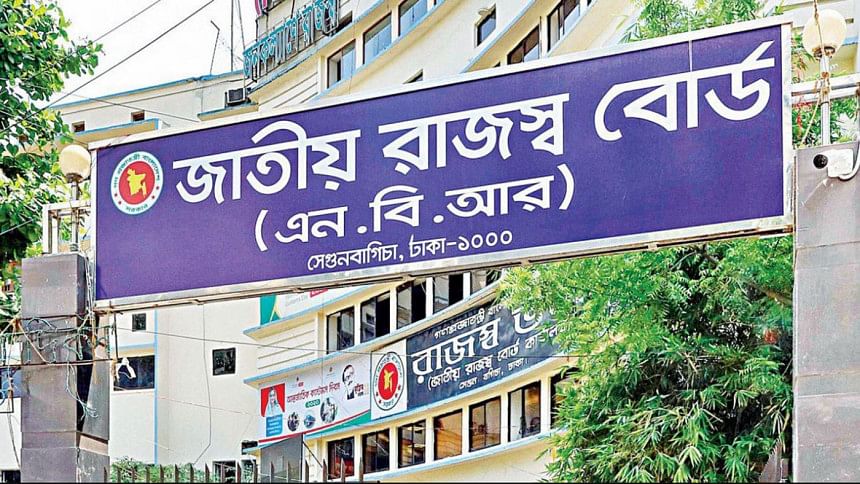Tax collection target missed for 11th year in a row

For the 11th consecutive year, the National Board of Revenue (NBR) has missed its tax target in the face of slowing growth of collections amidst economic slowdowns and ambitious goals set by the government.
The NBR logged Tk 325,272 crore in overall receipts in fiscal year 2022-23, falling short of Tk 44,728 crore from its target for the fiscal year, according to its provisional data.
Tax collection grew only 8 per cent last fiscal year, which was almost half of the 14 per cent growth the NBR achieved the previous year.
"The final collection figure shows the shortfall from the target that what we had apprehended earlier," said Ahsan H Mansur, executive director of the Policy Research Institute of Bangladesh.
The National Board of Revenue logged Tk 325,272 crore in overall receipts in fiscal year 2022-23, falling short of Tk 44,728 crore from its target.
"The main problem is administrative capacity of the NBR. Along with it came economic slowdown," he said.
"Corporate income has declined. Imports and commodity prices have dropped too," he said.
The FY23 revenue receipts also fell short of the Tk 345,630 crore target set by International Monetary Fund (IMF) for Bangladesh as a part of its $4.7 billion loan approved in January this year.
Data by the NBR showed that tax collection from imports and exports grew only 2.5 per cent year-on-year to Tk 91,717 crore during the July-June period of fiscal year (FY) 2022-23.
Meanwhile, income and travel tax receipts rose 9.6 per cent to Tk 112,921 crore.
Only collection of VAT, the biggest source of revenue collection, grew by double digits, 11.2 per cent, enabling the NBR to record Tk 120,633 crore, according to the NBR data.
The provisional figure of the full year's collection comes two weeks after the national budget for the current FY24 was passed giving the NBR the task of collecting Tk 430,000 crore.
Data showed that the new goal is 32 per cent higher from the total collection of the FY23.
"Achieving the target will be impossible," said Mansur, also a former economist at the IMF, "At best, the NBR would be able to collect 15 per cent higher tax," he said.
The economic situation is likely to become more depressed this fiscal year as Bangladesh Bank adopts a contractionary monetary policy, said Mohammad A Razzaque, director of the PRI Study Centre on Domestic Resource Mobilisation (CDRM).
"Interest rate hike and increased cost of businesses will bring down economic dynamism and revenue mobilisation will be more difficult," he said.
Mansur however said the revenue target given for the current fiscal year is "very much achievable".
"It should be achieved," he said, adding that the NBR could not achieve the target for its administrative failure.
Without modernisation of the tax administration and automation, reduction of direct and regular contact between taxpayers and tax administration as well as separation of revenue collection from policymaking, the tax target will not be achieved, he added.
Mansur said the slower growth in revenue collection might cause Bangladesh to go for a separate negotiation with the IMF.
As per the IMF's task list, Bangladesh was supposed to ensure a higher revenue collection and prevent the forex reserve from falling. That could not be achieved, he added.
"So stronger measures have to be taken. At least sale of forex from reserve has to be stopped," he said.
It was understandable from the very beginning of last fiscal year that the revenue collection target was likely to be missed, said Towfiqul Islam Khan, senior research fellow of the Centre for Policy Dialogue (CPD).
The target was too ambitious. During the course of the year, the government also took several austerity measures, including that involving public expenditure and imports, which negativity affected the revenue collection, he said.
While it is true that the tax-GDP ratio is very low in Bangladesh and the government has laid emphasis on it as a part of the IMF conditionalities, the NBR should focus on revenue collection by any means, he added.
This year's fiscal measures, passed under the budget for FY2024, clearly indicate that the NBR does not necessarily take into consideration the distributive and strategic concerns adequately, said Khan.
The key approach for tax collection should curbing tax evasion and illicit financial outflow, he added.

 For all latest news, follow The Daily Star's Google News channel.
For all latest news, follow The Daily Star's Google News channel. 



Comments